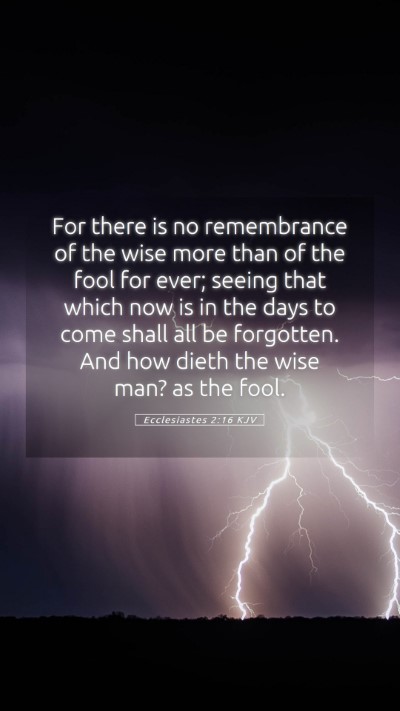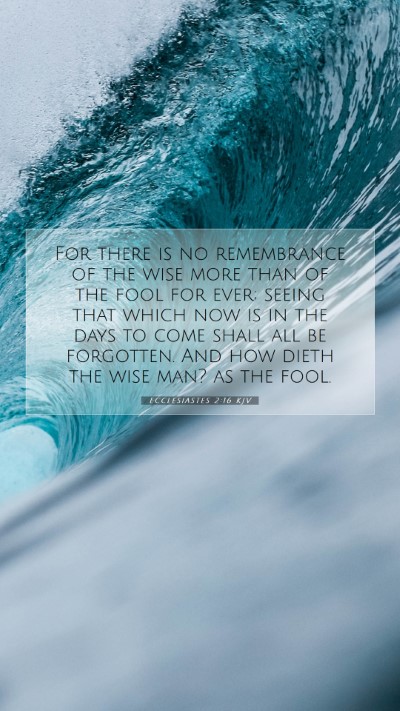Understanding Ecclesiastes 2:16
Verse: "For there is no more remembrance of the wise than of the fool forever; seeing that which now is in the days to come shall all be forgotten. And how dieth the wise man? as the fool."
Bible Verse Meaning
This verse from Ecclesiastes reflects on the fleeting nature of human wisdom and legacy. The author, traditionally considered to be King Solomon, wrestles with the idea that regardless of one’s wisdom or foolishness, both are ultimately subject to the same fate—death and obscurity. The wise man, despite his knowledge and understanding, finds no enduring significance compared to a fool in the long run.
- Temporal Nature of Life: All individuals, wise or foolish, will face death, which renders earthly achievements and distinctions meaningless.
- The Inevitability of Forgetting: Our legacies may fade over time; the text questions the value of wisdom if it does not lead to lasting remembrance.
- Existential Reflection: The passage urges believers to ponder the meaning of their lives, prompting introspection about how we invest our time and energies.
Bible Verse Interpretations
According to Matthew Henry's Commentary, this verse illustrates that earthly wisdom, while valuable in life, ultimately cannot escape the reality of death. Even the best of human pursuits will not assure a lasting legacy. Albert Barnes echoes this sentiment, emphasizing that the wise person, like the fool, will perish and be forgotten, highlighting the futility of seeking satisfaction solely in earthly knowledge and accomplishments.
Bible Verse Commentary
Adam Clarke expands on the idea that wisdom should inspire one to seek something greater than mere knowledge, suggesting that true fulfillment comes from piety and a relationship with God. The contrast between the wise and the foolish serves to remind readers of life’s ultimate transience, urging them to consider spiritual pursuits over temporal success.
Scripture Analysis
This verse serves as a reminder that worldly accomplishments are transient. The popular belief that wisdom brings eternal recognition is challenged here, showcasing the struggle between human ambition and the harsh reality of mortality. Ecclesiastes 2:16 concludes that both the wise and foolish have the same fate, thus calling for an evaluation of one's life priorities.
Cross References
- Job 12:17-25: Highlights the fate of wise and foolish men alike.
- Psalms 49:10: Reflects on the inevitability of death for all human beings, showcasing the futility of wealth and wisdom.
- Proverbs 10:14: Discusses the importance of wisdom in life but ultimately points out that prudent men hold knowledge while fools bring trouble.
Application of Bible Verses
This verse encourages believers to reflect on how they spend their lives. Instead of merely accumulating knowledge or striving for success, one should seek a deeper connection with God, understanding that wisdom rooted in faith has eternal significance. The passage invites us to evaluate what truly matters in our lives and assures us that a life driven by spiritual values has lasting remembrance beyond death.
Conclusion
In summary, Ecclesiastes 2:16 offers profound insights into the nature of wisdom and foolishness, challenging believers to seek deeper spiritual truths amidst the ephemeral nature of earthly achievements. It serves as a poignant reminder to focus on what endures even after our time on earth has passed.


